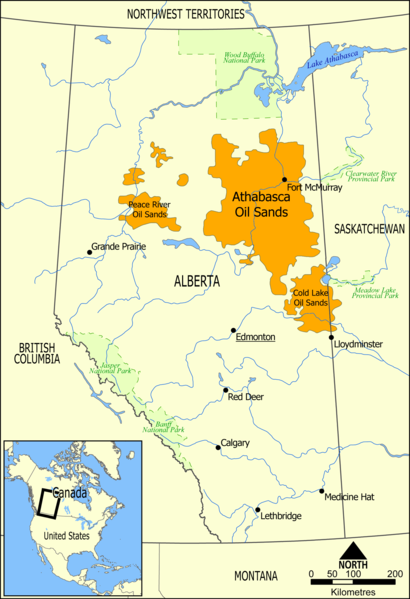 Midwest oil refineries are gobbling up more and more crude oil from Canadian tar sands and are set to belch out up to 40 percent more greenhouse gas emissions in the next decade.
Midwest oil refineries are gobbling up more and more crude oil from Canadian tar sands and are set to belch out up to 40 percent more greenhouse gas emissions in the next decade.
According to the Chicago Tribune, oil refineries across the Midwest are set to expand (see graphic) and are planning on processing heavy crude oil from Canadian tar sands, part of an industry-wide trend to buy more Canadian crude.
Canada has huge reserves of tar-soaked clay and sand known as "tar sands" lying under the swampy forests of northern Alberta. At today's higher oil prices, these tar sands are seen as a profitable and reliable source of oil but they require environmentally devastating mining processes and vast amounts of energy to extract. The resulting heavy crude oil requires also more energy to process at refineries. Researchers have calculated that refining the Canadian tar sands crude produces 15 percent to 40 percent more carbon dioxide emissions than conventional oil, the Tribune reports. (Editors note: I believe this does not include "upstream" emissions resulting from the energy intensive mining processes.)
As the Tribune points out, with no greenhouse-gas regulations currently in place, oil companies face no costs for the extra pollution they will churn into the atmosphere.
"This is a glaring example of how our energy policy and climate policy are at cross purposes," said Judi Greenwald, director of innovative solutions at the Pew Center on Global Climate Change. "Companies are making decisions that really don't make sense on a national level when you fail to take climate change into account." Increasing reliance on environmentally destructive and carbon-intensive tar sands is a very worrying trend and presents a glaring inconsistency as Midwestern governors, leading presidential candidates and the US Congress all work on policies that will help drive greenhouse gas emissions reductions.
Increasing reliance on environmentally destructive and carbon-intensive tar sands is a very worrying trend and presents a glaring inconsistency as Midwestern governors, leading presidential candidates and the US Congress all work on policies that will help drive greenhouse gas emissions reductions.
"If carbon isn't considered in these huge investments, we are going to be stuck with a tremendous burden," said Henry Henderson, a former Chicago environment commissioner who now heads the Natural Resources Defense Council's Midwest office.
Like coal-to-liquids synthetic fuels, this un-conventional source of fuel may help reduce reliance on Middle Eastern oil, but only exacerbates global warming. Comprehensive global warming regulations are needed quickly so that decisions about alternative fuels incorporate both concerns about energy independence AND global warming and do not simply trade one huge problem - our oil addiction - for another - accelerating climate change.
Read more at the Chicago Tribune.
[A hat tip to Grist. Graphic from the Chicago Tribune and Wikipeida]
Wednesday, February 13, 2008
Midwest Oil Refineries Gobble Up Canadian Tar Sands, Spew Greenhouse Gasses
Posted by
Jesse Jenkins
Ads at www.WattHead.org:
Wind Turbine Training
Solar Panels and Kits for the Home
Solar Energy Products and Home Solar Panels
Wind Turbine Training
Solar Panels and Kits for the Home
Solar Energy Products and Home Solar Panels
Subscribe to:
Post Comments (Atom)













2 comments:
Interesting article, I have wondered what the effect exploration of the tar sands would have on the greenhouse gas emissions associated with gasoline. Considering that this and projects like it are probably going to be the long term future of petroleum, it doesn't look good.
yeah., very interesting and informative article...i just hope its safe in our environment.
Post a Comment